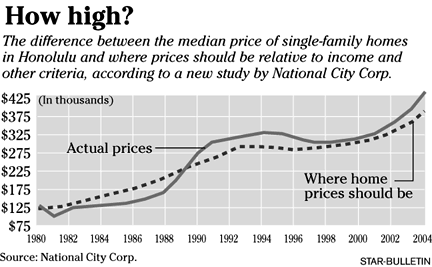
|
Honolulu homes
14% overvalued,
report says
Local experts say Oahu home
prices are nowhere near a bubble
Honolulu is not in imminent danger of a housing bubble, but homes here are overvalued, according to a new study from the economics department of National City Corp., a Cleveland-based bank holding company.
The study, conducted by Richard DeKaser, chief economist of National City, examined what home prices should be in the top U.S. real estate markets taking into account population density, relative income levels and historically observed market premiums or discounts.
Measured against those criteria in DeKaser's study, Honolulu prices are 14 percent overvalued.
He identified housing "bubblettes," or significantly overvalued regions at high risk of falling prices, in one-fifth of the U.S. housing stock from 99 major markets.
DeKaser's study, which uses statistical data from 1980 to 2004, identified potential bubbles in cities such as Chico, Calif., where a buyer will pay the highest premium for a home -- 43 percent above where DeKaser estimates prices should be.
Premiums above 20 percent may indicate prices will fall in the future, and can be found in San Francisco, Miami and Los Angeles, the study said. Homes in other markets, such as Honolulu, New York and Chicago, are selling at premiums between 10 percent and 20 percent and should signify concern -- but not alarm.
While local experts have forecast that Oahu's home prices, which grew 21.1 percent last year, will keep rising, few believe the market is headed for a bubble, said Harvey Shapiro, a research economist for the Honolulu Board of Realtors.
"While the numbers look high, we haven't had incredible growth compared to California. Our price growth has been similar to other places," Shapiro said. "I don't believe that we are coming into a bubble area at all."

"When people look at our properties they don't have sticker shock anymore," Shapiro said, adding that many of California's markets, such as Orange County, which posted a median single-family home price of $627,500 in the fourth quarter, are much higher.
Oahu's market gains of the past five years have been relatively modest compared with price growth during the height of Hawaii's bubble period when Oahu's median home prices rose 110 percent from 1987 to 1990, Shapiro said.
But single-family home prices nationwide have been climbing faster than household incomes for a decade, driving the ratio of home price to household income to its highest level in at least the past 30 years, DeKaser said.
At the same time, however, falling mortgage rates have made homes more affordable, he said.
"The true test of today's premiums in these markets will be the economic environment, especially incomes and interest rates, in the years ahead," DeKaser said.
DeKaser's study "probably isn't forward enough looking to give accurate buy or sell signals or to be sufficiently informative of a bubble," said Bank of Hawaii Chief Economist Paul Brewbaker.
Although Honolulu is listed as in danger of becoming a bubble zone on DeKaser's list, limited housing supply coupled with high demand is likely to keep prices rising and the market strong, Brewbaker said.
"My view on Oahu home prices from this point forward is that they will rise, and then go sideways, contingent on two events of the 1990s -- substantive military downsizing or substantial out-migration and significant state-funded homebuilding volumes -- not repeating themselves," Brewbaker said.
If DeKaser completes the same study next year, Honolulu's rising prices will likely move it to the top fifth of cities in the nation, Brewbaker said.
"But that still doesn't mean that we'll be in a bubble," he said.
www.nationalcity.com/economics
[News] [Business] [Features] [Sports] [Editorial] [Do It Electric!]
[Classified Ads] [Search] [Subscribe] [Info] [Letter to Editor]
[Feedback]
